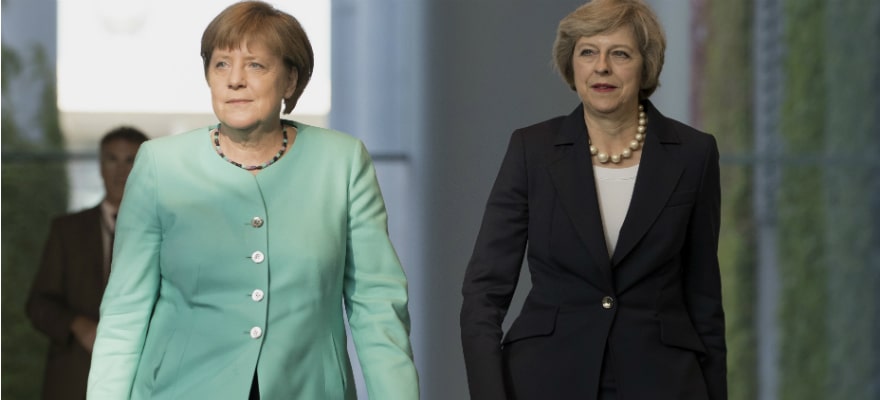On her first visit to continental Europe as Prime Minister, Theresa May was received by Angela Markel. The meeting between two of the most powerful leaders in Europe was quite friendly with little tension between two opposing sides in a process of negotiations which is likely to be quite protracted.
Theresa May has been vocal about delaying the implementation of Article 50, which is the formal procedure which triggers the start of the exit of the United Kingdom from the European Union. While a number of European leaders have been vocal about the U.K. having to start the process as soon as possible, Angela Merkel has just provided a very welcome reprieve for the British PM.
The conciliatory tone between Theresa May and Angela Merkel could have positive ramifications for the U.K. remaining in the European Economic Area (EEA) which would warrant the passporting of financial Regulation between the FCA and other European financial regulators.
Every bit of tension between the sides is likely to ignite divergences and lead to tougher negotiations between the parties. While Merkel has been rather conciliatory, French President Francois Hollande has been vocally advocating for a quick exit of the U.K. from the European Union. Such a development is more likely to result in less common ground between the European and U.K. financial regulators.
Article 50 Still Hangs in the Future
Commenting on the upcoming negotiations, the German chancellor said: “To have a good negotiating process and a sensible and constructive one is in all of our interests. Indeed, the triggering of article 50 should be viewed as a necessary step at the current juncture, but hastiness which is demanded by European Commission’s leader Jean-Claude Juncker is seen as hostile.
With Germany exporting $100 billion annually to the UK, with the country being its second largest exports destination, the measured stance of Angela Merkel is not a surprise.
With Theresa May being given enough time to invoke Article 50, the uncertainty for UK businesses might continue for a period of two years, during which time the exit will be negotiated. Up until the official filing, the British PM aims to strike a clear tone as to what the goals of the negotiating strategy are.
Theresa May has repeatedly reiterated that Article 50 will not be triggered this year, which buys some time for companies in the UK to prepare for an exit. In a recent comment to City of London businessmen, the British PM said: “We want to get the right deal in trade and goods and services for the UK.”
How Britain will achieve this remains an open question. What is clear for now is that any sharp rhetoric from either side is a lose-lose situation.
In the case of a fragmented financial regulatory regime, the brokerages in the industry which are set to lose the most are the small ones, which can not afford to hold licenses both in the European Union and in the United Kingdom simultaneously.


















